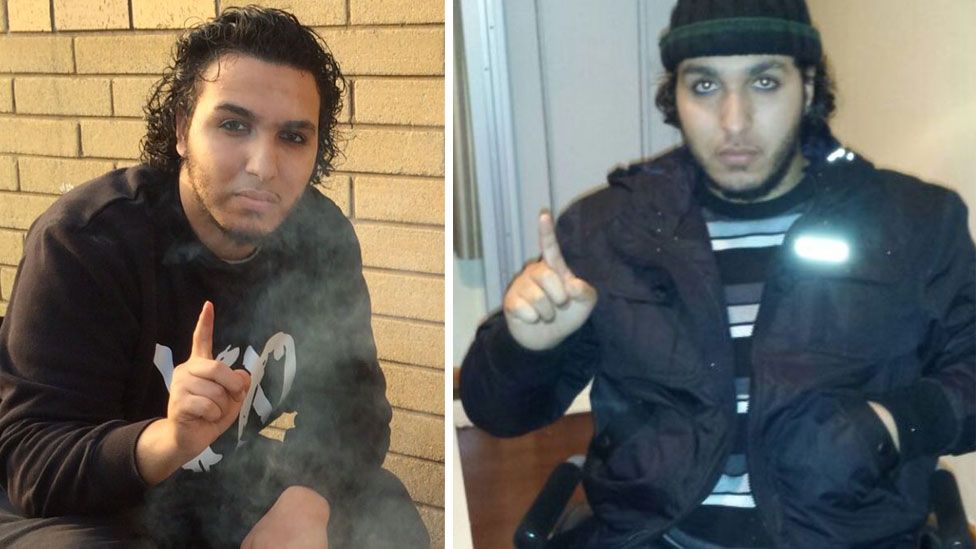Manchester Arena Inquiry: Prisoner in touch with bomber to be released
- Published

A convicted terrorist organiser, who has refused to tell an inquiry about his contact with the Manchester Arena bomber, is to be released from jail.
Abdalraouf Abdallah, 27, was jailed in 2016 after being found guilty of helping people travel to Syria to join the Islamic State group.
The Manchester Arena Inquiry heard he was in touch with bomber Salman Abedi in the months leading up to the attack.
The BBC understands he will be released on licence later this week.
A source said his licence conditions would be among the strictest imposed on a released prisoner.
The Manchester Arena Inquiry, which is investigating all aspects of the attack carried out by Salman Abedi in May 2017 that killed 22 people, has heard that Abdallah is a "witness with important evidence to give".
But, when interviewed in prison this summer by inquiry lawyers, Abdallah refused to answer any questions in case he incriminated himself.
Abdallah, who moved to the UK as a child and grew up in south Manchester, was paralysed from the waist down while fighting in the Libyan revolution of 2011.
In July 2016 he was jailed for five years and six months, having been convicted following a trial, but time spent on remand and on curfew at home means that his custodial sentence expires this week.
When released, he will spend a further four years on licence.
His trial heard that, from his wheelchair and mainly using a mobile phone, Abdallah arranged for the movement of money and fighters to Syria.
When Abdallah was sentenced, the judge said "there was no evidence of indoctrinating of others".
However, the Arena inquiry has heard that when Abdallah had been arrested in 2014, his phone contained correspondence with Abedi about suicide, martyrdom - including the death of a senior al-Qaeda figure - and "maidens of paradise".
Those who knew Abedi considered Abdallah to be a radicalising influence on him.
Abedi visited Abdallah in prison and spoke to him on an illegally held mobile phone during the period in early 2017 when the bomb was being prepared.
The prison authorities confiscated Abdallah's phone before the attack and - when analysed - it was found to have been used to make calls and attempted calls to Abedi's number.
That a man jailed for terrorist organising via a phone was able to obtain a mobile in prison, which he used to speak to a known extremist like Abedi, is a focus for the inquiry.
Paul Greaney QC, counsel to the public inquiry, has said the relationship between Abdallah and Abedi seemed to have been of "some significance in the period prior to the bombing and we are determined to get to the bottom of it".
Lawyers for bereaved families have said the "failure to recognise the association between Salman Abedi and Abdalraouf Abdallah was a real missed opportunity".
Like Abdallah, the Abedi family have refused to answer questions posed by the inquiry, with eldest brother Ismail Abedi also asserting a claimed privilege against self-incrimination.
It is understood that Abdallah's licence conditions will be similar to those imposed on the hate preacher Anjem Choudary, who was released on licence two years ago.
The measures are understood to include:
- Being placed in supervised probation accommodation not in Manchester, wearing a GPS tag, obeying a curfew and reporting in several times a day, as well as engaging with the government's "desistance and disengagement" de-radicalisation scheme
- Barring him from Manchester city centre, where the inquiry is taking place, as well as Moss Side and surrounding areas in the south of the city, where he previously lived
- A ban on unsupervised internet use, limits on phone use, surrender of his passport, and not being allowed to give talks or sermons
- He will also not be allowed contact with any serving prisoner or anyone convicted of a terrorism offence, nor unsupervised contact with anyone under 18
There has been significant public debate over the past the year following attacks in London - at Fishmongers' Hall and Streatham - by recently released prisoners convicted of terror-related offences.
An independent review has highlighted a catalogue of failings in how offenders are managed after release, making 45 recommendations for how the system needs to improve.
A Ministry of Justice statement said: "Terrorists released on licence are supervised by the probation service, with the support of police and the security services, and subject to strict conditions including restrictions on their internet use, movements and contact with others.
"If they break those conditions they can be brought back to prison."
- Published9 September 2020
- Published15 July 2016
- Published11 May 2016